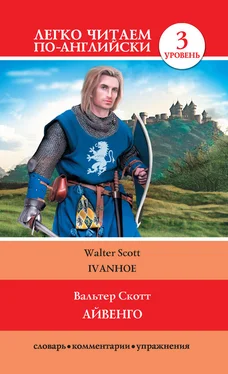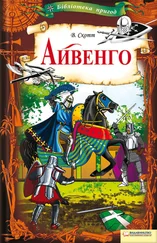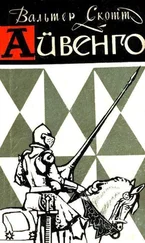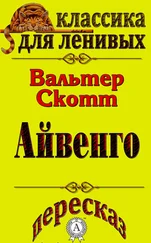* * *
The dinner was ready on a long oaken table in the wide hall of Rotherwood. There were two great chimneys at the two ends of the hall. The table was in a form of letter T with the shorter part reserved for the host and his guests. In the centre of this part stood two high chairs. On one of them sat Cedric the Saxon, a strong and frank man, though proud, hasty and jealous. He was almost sixty.
Cedric was not in a good mood. The Lady Rowena had just returned from church and was changing her clothes, and he had to wait for her. There were no news of Gurth and his herd (pigs were an important part of the Saxon’s wealth). He also wanted to see Wamba – his favourite jester – who was absent. And finally he hadn’t eaten anything since noon.
“What keeps Gurth so long? Our Norman neighbours are only waiting to steal our herds. Gurth is probably dead already! And Wamba – was he carried away to amuse some Norman lord?”
He thought about his banished son Wilfred, and irritation gave way to sadness. His thoughts were disturbed by a loud sound of horn.
His servants ran to the gates and returned with the news that “the Prior Aymer of Jorvaulx, and the good knight Brian de Bois-Guilbert, commander of the order of Knights Templars, asked for hospitality and lodging for the night”.
“Aymer, the Prior Aymer? Brian de Bois-Guilbert?” muttered Cedric; “They are both Normans… But Norman or Saxon, the hospitality of Rotherwood is unbreakable, they are welcome. Go, Hundebert, take six servants, and show the guests to their rooms. Give them fire, and water to wash, and wine and ale; and ask the cooks to add what they can to our evening meal.
The servants went out.
* * *
Cedric rose to receive his guests.
There was a lot of food on the table: different kinds of meat and fish together with huge loaves of bread and desserts made of fruits and honey.
When everybody was ready to eat, a servant announced the arrival of the Lady Rowena. A side-door opened, and Rowena, followed by four female servants, entered the apartment. Cedric conducted her with ceremony to the second high seat. All stood up to receive her.
The Prior whispered to the Templar: “Do not look at the Lady Rowena like that, the Saxon sees you.” But Brian de Bois-Guilbert did only what he wanted to do. So he kept his eyes fixed on the Saxon beauty.
Rowena was tall, yet not too much. Her clear blue eyes beneath graceful brown eyebrows seemed capable to command as well as to beg. It was clear that she was accustomed to be respected by everyone. When Rowena noticed the Knight’s eyes fixed on her, she drew the veil around her face – to show that she did not like his behaviour. Cedric noticed it. “Sir Templar,” said he, “the cheeks of our Saxon maidens have seen too little of the sun to bear the fixed glance of a crusader. [11]”
“If I have offended,” replied Sir Brian, “I beg the Lady Rowena’s pardon.”
“The Lady Rowena,” said the Prior, “has punished us all. Let me hope she will be less cruel to the guests who will come to the tournament.”
“Our going there,” said Cedric, “is uncertain”.
“Sir Knight,” said Rowena with dignity, and without unveiling herself, “can I ask you to tell us the latest news from Palestine?”
“I have little to say, lady,” answered Sir Brian de Bois-Guilbert, “except for confirmed news of truce with Saladin. [12]”
Conversation was here interrupted by the entrance of a servant, who announced that there was a stranger at the gate asking to let him in.
“Do it,” said Cedric, “whoever he is.”
* * *
The servant returned and whispered into the ear of his master, “It is a Jew, who calls himself Isaac of York; should I lead him into the hall?”
“St Mary,” said the Abbot, crossing himself, “an unbelieving Jew, [13]and accepted into our company!”
“But my worthy guests,” said Cedric; “my hospitality must not be bounded by your dislikes. If Heaven let the whole nation of stubborn unbelievers exist for so many years, we can tolerate the presence of one Jew for a few hours.”
A tall thin old man entered bowing. He had an aquiline nose, [14]piercing black eyes and long grey hair and beard.
He was not received well. Cedric only coldly nodded to him, and nobody made room for him at the table.
While Isaac stood looking in vain for welcome or resting place, the Palmer who sat by the chimney pitied him, and stood up saying, “Old man, my clothes are dried and I have eaten, you are both wet and hungry.” He took some food from the long table, put it upon the small table at which he had himself sat, and went to the other side of the hall, without waiting for the Jew’s thanks.
In the meanwhile the conversation continued.
“Were there any knights in the English army,” said the Lady Rowena, “who fought as bravely as the knights of the Temple, and of St John? [15]”
“Forgive me, lady,” replied De Bois-Guilbert; “the English monarch indeed brought to Palestine an army of brave knights, second only to those who were constant defenders of that blessed land.”
“Second to none,” said the Palmer, who had stood near enough to hear. Everybody turned in his direction.
“I say,” repeated the Palmer in a firm voice, “that the English knights were second to none. I say that I saw how King Richard and five of his knights fought and defeated three knights each at a tournament in the Holy Land. I add that seven of these defeated knights were knights of the Temple—and Sir Brian de Bois-Guilbert knows it is true.”
It is impossible to describe the rage of the Templar. He even put his hand on the handle of his sword.
Cedric didn’t notice the reaction of his guest, he asked the Palmer to name the English champions. The Palmer named five, starting with King Richard. After a moment he said that he didn’t remember the sixth knight.
“Sir Palmer,” said Sir Brian de Bois-Guilbert, “I do not believe you have forgotten his name. But I will myself name the knight, before whose lance I fell due to bad luck and a problem with my horse. It was the Knight of Ivanhoe. And I say this loudly: if he comes to England and repeats his challenge in the next tournament I will fight with him.”
“He is not here,” replied the Palmer, “so you’ll have no answer. But if he ever returns from Palestine, I’ll make sure that he meets you.”
The dinner ended and the guests went to their rooms.
“Unbelieving dog,” said the Templar to Isaac the Jew, when he passed him in the crowd, “are you going to the tournament?”
“I am,” replied Isaac, bowing in all humility.
“Yes,” said the Knight, “to make even more money—I believe there is a lot of coins in your bag.”
“Not one coin, I swear!” said the Jew, “I go there only to ask the help of my brothers. I am poor!”
The Templar said, “You are a liar!” and went forward to talk to his Muslim slaves in a language unknown to anybody around.
* * *
When the Palmer was following a servant down the corridor they met a servant of Rowena, who said in a tone of authority that her mistress wanted to speak with the Palmer. She led him to a big and richly decorated room, where Rowena was preparing for sleep. The Palmer bowed.
“Rise, Palmer,” said Rowena graciously. “The defender of the absent has a right to favourable reception from all who value truth. Can you tell me anything about the knight of Ivanhoe?”
“I know little about this knight,” answered the Palmer. “I believe he is going to return to England soon, where you, lady, must know better than I, what is his chance of happiness.” The Lady Rowena sighed deeply.
Читать дальше
Конец ознакомительного отрывка
Купить книгу












